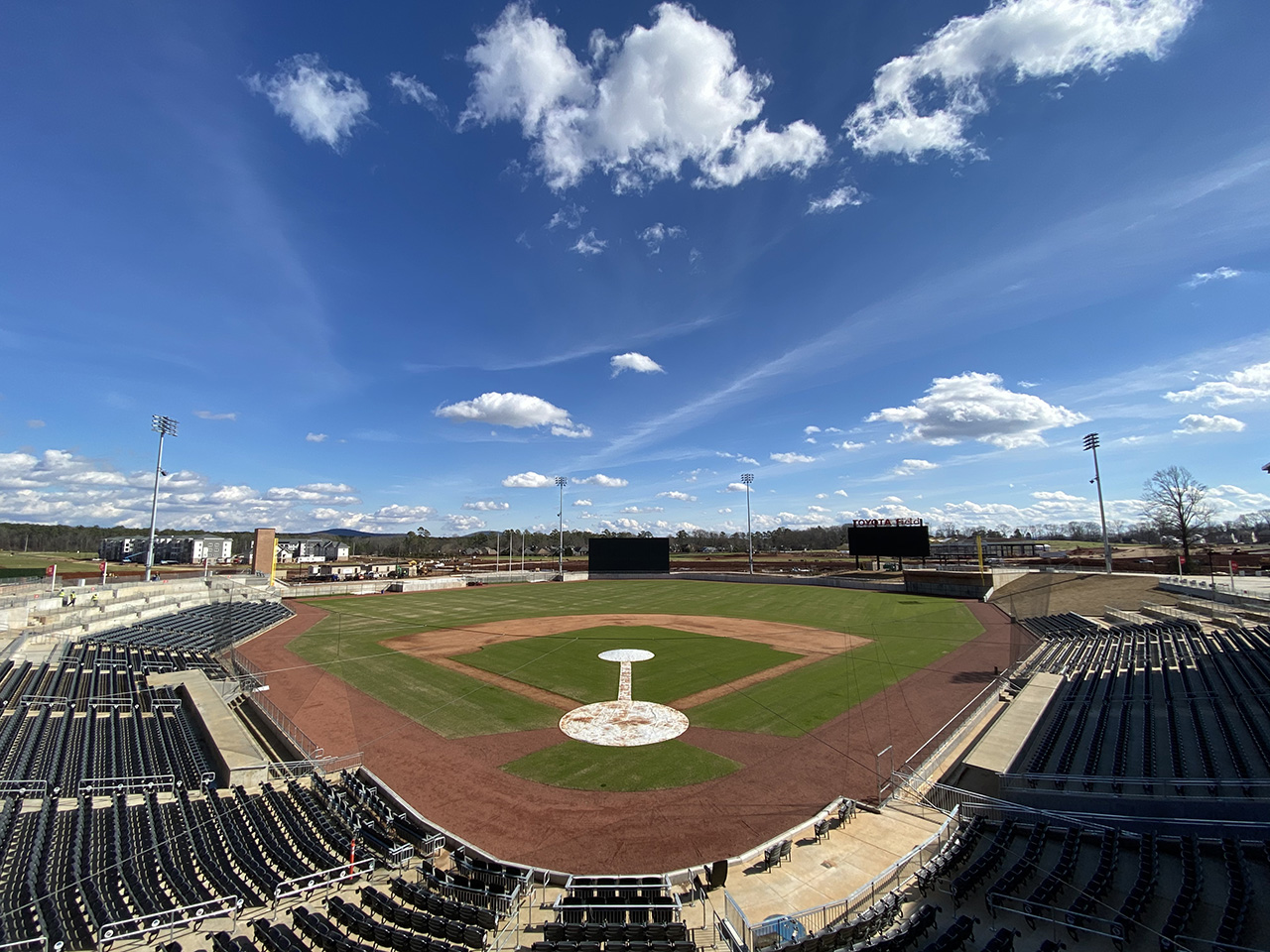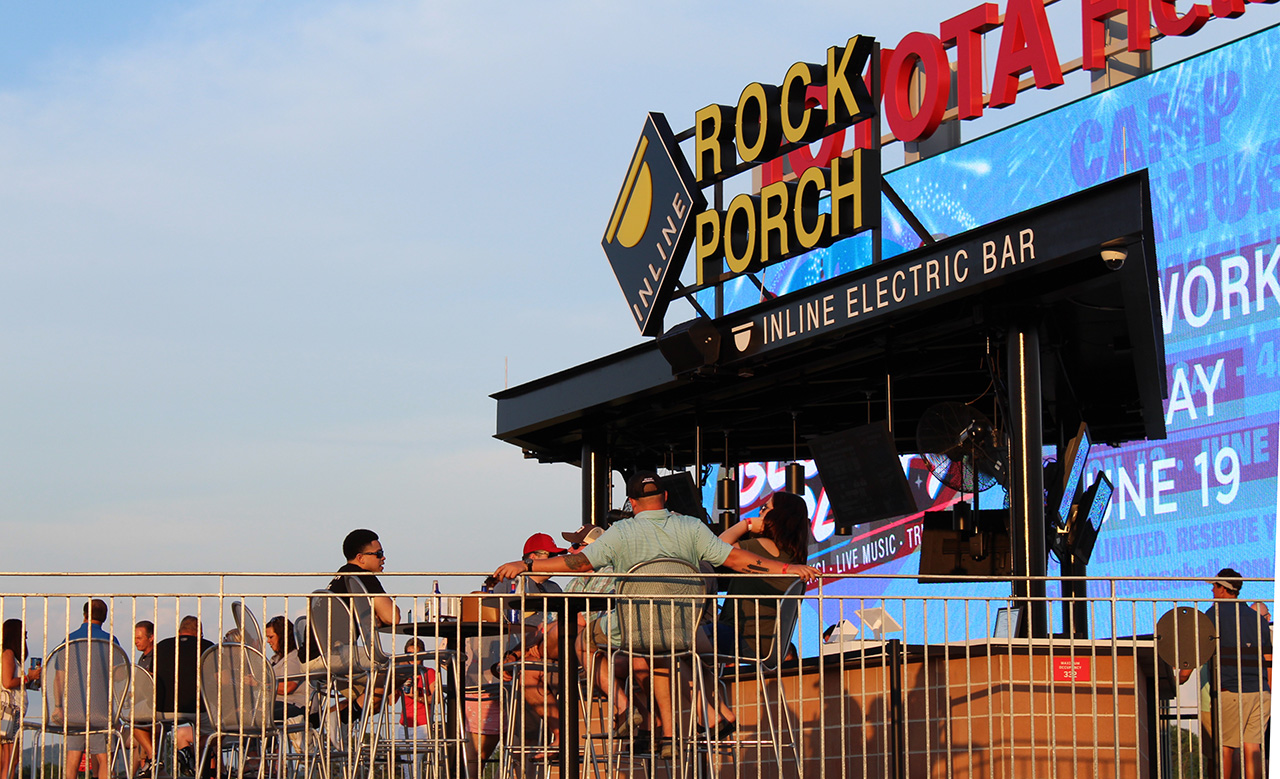After six long years since the Huntsville Stars left Joe Davis Stadium, baseball returns to the area with the arrival of the Rocket City Trash Pandas (Class AA; Southern League) to Madison’s Toyota Field, ready to host Minor League Baseball when play resumes.
Ralph Nelson, Managing Partner and CEO of the Rocket City Trash Pandas, engineered the purchase and move of the Mobile BayBears for the 2020 season.
“I had the idea of buying a minor league team in July of 2015. The next step was raising investment capital. I started traveling around and looking for a place to build a stadium,” Nelson said. “March 31, 2017 was my first day in Madison to look at the site where the ballpark currently stands.”
Nelson knew David Bower, a Principal Senior Architect for Populous, from another construction project and asked him to work on Toyota Field.
“When we were both younger, I was the Assistant GM of the San Francisco Giants and he was at HOK at the time. We oversaw the construction of the Scottsdale Stadium Complex in Arizona,” Nelson said. “When the City of Madison came to me and said they wanted to move forward with this stadium, I called Dave. It was 20 years late and it was our second time working together on a stadium. It’s kind of full-circle.”
As with any real-estate purchase, one important decision was location, location, location.
“The Populous guys think it’s one of the best sites in the minors. It sits right off the busiest highway in North Alabama. It has its own off-ramp, which is kind of rare for a minor league team, and it was going to be in this big mixed-used development,” Nelson said.
With different types of properties on the 600-acre development, the team got advice from developers who put together SunTrust Park and the development around it, including The Battery.
“Toyota Field is really a larger anchor to this development. It will have residential, retail, and lifestyle properties,” said Mike Sabatini, a Principal Senior Architect for Populous and the Lead Designer for Toyota Field. “We met with a developer involved with the Braves’ development and took some cues from that. It’s obviously not the same scale as Atlanta but we took some cues from there on how to develop these properties and what they would look like. We looked at how it was orientated and developed and what the future development around the ballpark might be.”
Overcoming weather woes
Construction began in the fall of 2018. One of the main challenges for Hoar Construction and Turner Construction as the project began was rain that just wouldn’t go away.
“Since construction started in 2018, they’ve had the two wettest winters in this area on record. The amount of rain was unbelievable,” Nelson said. “They were constantly working in the rain. There was one time when a decision was made to backfill the basement with gravel because we couldn’t wait any longer for the ground to dry.”
A few design ideas were also tweaked during construction.
“The original design had a tunnel that went from the field up to the clubhouses and because of that, visiting players on the third-base side had to go across the field to get to their clubhouse,” Nelson said. “Minor League Baseball asked us to put a restroom in the dugout so the visitor’s dugout had to be demolished, redesigned, and started over again.”
Part of the design process was deciding what features to include in the new ballpark.
“We took a lot of cues in terms of architecture and seating areas with local amenities in Madison,” Sabatini said. “There is a quarry that sits not too far from here. In right field, there’s the Rock Porch, which was to represent the cliff of the quarry. It’s ideally a 365-day bar where you can go, sit, and enjoy company.”
One defining feature of Toyota Field is the ballpark’s red roof, which was already part of the plans before Toyota came aboard as the stadium sponsor.
“When they host an All-Star Game and those kinds of things, people will recognize Madison because of how it looks like the red roof,” Sabatini said. “It’s iconic. The roof was there prior to Toyota joining us but now it’s Toyota Field with a red roof and it’s a signatory. It has its own identity and will catch peoples’ eyes as they go along the highway.”
More than baseball on the agenda
As with many other ballparks around the country, Toyota Field was designed as a multi-use facility and can host many types of events including football games and soccer matches as well as concerts.
“The mayor really wanted to also provide an area where the mayor could do a State of the City address annually,” Sabatini said.
Toyota Field will also be open on non-game days.
“That’s a major push for this ballpark is to kind of give back to the community. It’s not just about baseball,” Sabatini said. “It’s the idea that you have this connection to baseball and are utilizing its assets for the community. The mayor was pretty specific that we had a 360-degree concourse to walk around the ballpark as part of an exercise program that might expand out to the development. The batting tunnels are actually up on the concourse with the idea that you could lease that out for parties and use them.”
The ballpark will also have a variety of unique seating options.
“There are patio suites that don’t have fixed seating out front like you’d see with a typical seat with chair backs,” Sabatini said. “You could put high-top tables and drink rails out there. It’s pretty flexible and something that is unique for this facility.”
Family-friendly experiences were also designed for Toyota Field.
“One other thing was the Toyotal Outfield Experience. They are going to have a 10- to 15-stop progression around the outfield that will tell the story of how Toyota Field came to the Madison/Huntsville area,” said Doug Beichley, Project Manager for Toyota Field. “The kids can pick up a map at the beginning and go around the concourse as they check off everything. At the end of the line, they get a patch or sticker or some kind of prize.”
After 15 months, construction was completed in February and was ready for Opening Day on April 15. Plans were being developed for future phases of development project in the ballpark area, but the pandemic will probably push them back.
“We were interested in the integration of Margaritaville. The plan was for a lazy river in right center field and a pool that you can rent out similar to the Diamondbacks,” said Beichley. “That’s unique and fun. The Land Shark bar and the Margaritaville bar would both be integrated into the outfield experience.”
Community enthusiasm for Trash Pandas
Despite coronavirus tabling the beginning of the season, Nelson said the community hasn’t lost any momentum or excitement for the return of pro ball to the area.
“I was in Major League Baseball for 25 years. I was in Arizona in 1997 and 1998 when the Diamondbacks came to town. There was nowhere near the enthusiasm for the Diamondbacks then as there has been here for Minor League Baseball,” Nelson said. “There were 2,200 people at the groundbreaking ceremony. Over 32,000 people participated in naming the team. We had 7,500 show up for the logo reveal. It is by far the most welcoming of any community that I know of. I’ve never seen anything like this.”
While some teams are struggling, the Trash Pandas have seen their merchandise numbers continue to stay strong during the shutdown.
“We have hit $2.5 million in merchandise sales since October of 2018. We opened a store in a local mall. It was originally just going to be a holiday store. We ended up keeping it open ever since,” Nelson said. “We continue to sell an unbelievable amount. We normally have been doing between $1,200 to $2,000 online per day. Our merchandise has helped us a lot. It helped create some revenue that we didn’t anticipate.”
Additional revenue includes season tickets, which Nelson said has exceeded his expectations.
“My original goal, which a lot of people told me was too optimistic was 1,330 season tickets. We just hit 1,900.”
Regardless of when baseball returns, one thing is for certain. The Rocket City Trash Pandas and the surrounding communities are ready.
“I felt disappointment from the coronavirus and thought we wouldn’t be able to recapture the momentum and people said it’s not going to matter. When we play we’re going to be very successful,” Nelson said. “As time has passed, I sense the same thing. You have a community who lost baseball and I think people appreciate something after they’ve lost it. The community hasn’t lost interest and we’re ready to open the gates.”
Photos courtesy Rocket City Trash Pandas.
Disclosure: Ballpark Digest’s parent company, August Publications, has collaborated with the Trash Pandas on a book detailing the team’s evolution, set to be released after any resolution of the 2020 MiLB season.






